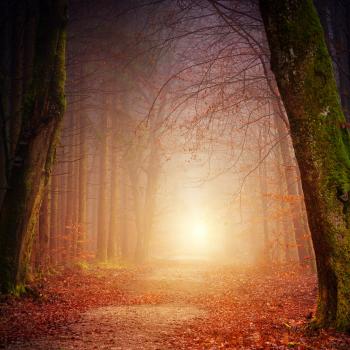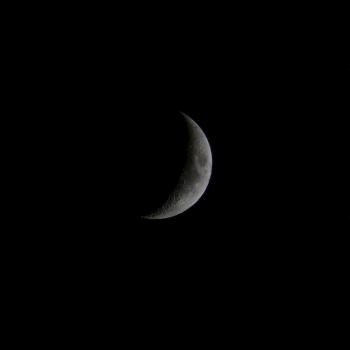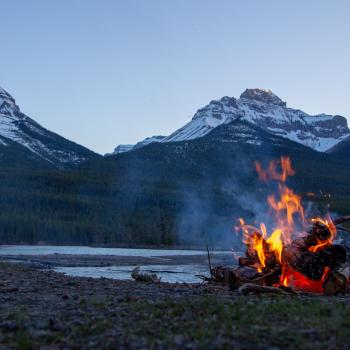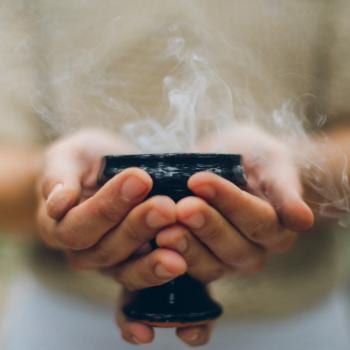A few posts backed I described my spiritual journeying method. Considering that the Gods and spirits I work with are ones that I first learned of through such journeys, and how big a role journeying plays in my practice, I thought it might be prudent to describe how I record and interpret the journeys I undertake.
Accurate Recording
As soon as I end a journey, I will try to write it down. Sometimes this will be handwritten in a journal, but I much prefer typing. Typing is quicker for me, allowing me to swiftly record the events and feelings of the journey. That does mean I need a computer nearby, but the spirits I work with are not averse to technology so that is a moot issue. (Obviously it would be more so if the spirits one interacts with dislike technology or cause severe technological problems.) I am able to use both handwriting and typing while journeying, but it tends to render any journeying lighter and shallow. I tend to prefer capturing the journey as soon as I can after it is finished rather than ‘double-dipping’.
When it comes to what exactly to record… Unfortunately, I do not know the details of what other practitioners record regarding their own journeys. When I first began my practice, I would record a lot of information concerning the day, timing, moon phase, weather, and such. I would try to record both the going-under and resurfacing from the journey, the physical sensations I experienced and my thoughts regarding the process, as well as whatever occurred during the journey itself. The visuals during the journey would be written in a dry fashion. It was useful for building up my journeying skills, at the time.
As I continued to journey and continued to write down my experiences – and share them with others – I began to write in a much looser fashion. It became much easier to record the actual feeling and experience of the journeys if I wrote it in a way I was comfortable with, that of fictional prose. That remains how I record my journeys to this day, predominantly. It would not surprise me if someone couldn’t discern my fictional journals from my journeying diaries, excepting for the latter being much more nonsensical.
I will sometimes record journeys in a more poetic format, usually if a journey was primarily about emotional responses or a great overarching feeling. These have less use as a recording tool but are more useful in helping me understand my frame of mind at the time.
It is, in my opinion, important to note the date that a journey takes place. Having such a clear record of the progression of time allows us to place the journey in a broader context and illuminates patterns within the year or month or our own life cycle.
One good reason to record experiences accurately is so that our memory has less opportunity to make a mess of everything. Our memories are not nearly as robust as we believe they are, and no amount of knowledge of that fact will actually help our memory be as ironclad as we wish. Recording what the journey was like, what Gods and spirits were encountered, the landscapes, what was said, what one felt…the sooner after a journey we record these details, the more accurate they will be. Then, days or weeks or months or years after, when that journey is still in our head – floating and changing as it will over time – we can return to our most accurate record and refresh what really happened. What our thoughts were at the time.
The elasticity of our minds makes it easy to retrofit symbols and meanings and emotion. But an accurate recording of journeys allows us to accurately reflect on the lessons we learn through journeying. We can check our later interpretation of the journeying and see if it actually aligns. It can also be wonderfully useful when we find ourselves wondering why certain symbols or omens are popping up; looking back on past journeys can shed light on when those symbols first appeared in a spiritual setting.
Wording and Phrasing
Unlike many others I have spoken to who journey, I do actually come away from some of my journeys with proper ‘sentences’ and words from the Gods and spirits. This isn’t to say that I ‘hear’ them as external voices, as if another human were speaking aloud in the same room. There have been rare occasions where it has felt that way, while I have been deep in a trance and fully lost to the world, but often it is the more ephemeral and typical intuitive ‘knowing’ of what a spirit is saying to me as I journey. To be fair, the clearest sentences I receive tend to be very simple in their meaning. Along the lines of ‘do this’ or ‘don’t do that’. Some Gods and spirits also seem more inclined to clear ‘human language’, so to say.
Some spirits will also be patient in conveying their meaning and desires, making it much easier to record what they want to say. Others lack any interest in being easily understood. And other spirits lack the ability to convey easily in human terms. Figuring out how to communicate and how to listen is vital in actually gleaning anything of practical use. And this is all without beginning to factor in the simple but frustrating interpersonal issues regarding journeying and spirit communication – sometimes I simply do not get along with a spirit! (A spirit that might be very friendly and easily get along with another friend or practitioner. There are ways to work around this, obviously, but knowing when you’re just not going to get anywhere is as important with spirit relations as it is with human relations.)
But even if a God or spirit conveys themselves in a way easily understood, the words they use won’t mean the same thing to every person. This goes beyond broader human-spirit differences, ‘cultural’ differences so to say, and has much to do with what we as individuals are bringing to the table.
As an example, some of the Gods and spirits I work with call me ‘little bird’. It’s a diminutive, conveying Their affection. But it also conveys a lot of other things regarding my self, my spirit body, my relationships with certain Gods… So when a God or spirit says that to me, it carries meaning that it would not for another person. Someone reading a journey of mine where I am called such a thing will bring their own ideas of what the nickname means that may or may not align with how I experience it during journeys.
Metaphors, Layers, Symbols
This, perhaps, is what makes interpreting and extrapolating information from journeys so difficult. I am of the belief that we bring all of ourselves when we journey (and when we pray, and hold ritual, and so on). What we see and experience during journeys is mystical and, ideally, true spirit connection, but it is through ourselves we process it all. All our traumas and complexes. All of our hopes and desires. Our own cultural conditioning. Our expectations and fears. The entirety of who we are both allows us to connect to the spirits and obfuscates their messages.
After all, what does the recurrence of, say, the color red in a journey mean? Well…that depends, doesn’t it, on what the culture you are raised in thinks of ‘red’. What does the appearance of a dragon in a journey mean? Or an ocean, or a river, or a forest? Foxes, or wolves, or cats? What of a divine figure and their appearance? What might it all mean?
Dreams and journeys are not so different, in that they are symbol upon symbol. Even when one has struck to the clearest journey, the clearest meaning one can find, our own perception impacts the symbols we see. Revelation as striking and true as an arrow might occur during a journey, yes, but often these revelations will not hold as much truth outside of the one who experienced the journey.
This is why I prefer to record my journeys in the style I do. It allows the freedom to capture the heart of the journey I experienced. But one should always strive to capture their journeys in the way that suits them and their Gods the best.
With the amount of journeying and praying and other nonsense I do, I’m able to tease out the symbols I feel resonate strongest with the spirits I work with. And since these are new spirits, new Gods, I have to tease out those symbols and associations. People working with older deities, historical deities with established symbology and mythology, have that to draw upon. I often feel rather as if I am in a workshop shoddily piecing together a poorly-built birdhouse. I hammer a piece in – like, ‘Aster is a fire spirit’ or ‘the Laetha is a god of destruction’ – and really, really hope I get it right.
I have to separate as much of myself, my own symbols and meanings, from the symbols that might resonate with others. With a broader group of people. And it’s an impossible task. No matter how much I try to strip myself out of the journeys, no matter how much I try to focus on just the Gods and spirits themselves, I am there. My own biases, my own fears, my own desires. It is impossible to untangle.















